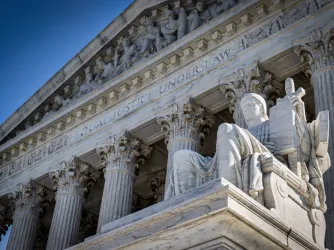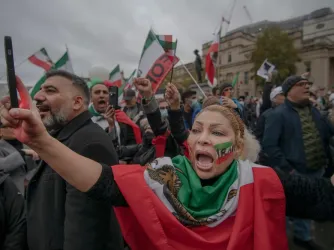Table of Contents
FIRE to Creighton University: Student-organized events do not endanger your tax-exempt status

Creighton University in Omaha, Nebraska revoked approval for an event organized by Turning Point USA after the school learned a conservative activist would speak.(Kristopher Kettner / Shutterstock.com)
After first approving a student-organized event to take place on campus, Creighton University revoked that approval when it learned the event’s name had changed and that a conservative activist would speak. To justify its decision, Creighton cited its obligations as a tax-exempt organization.
So, FIRE wrote to Creighton today to clear up the myth that students’ political speech can somehow endanger a university's tax-exempt status.
Students may hold and advocate for their political views, no matter how controversial, without endangering the university’s status.
As reported by the Omaha World-Herald, Creighton University revoked permission for the university’s Turning Point USA chapter to host a political event on campus when the group changed the event’s name from “Introduction to Nebraska Politics Conference” to “Take Back Nebraska Summit ’22.” Additionally, the university says it was concerned because the event would include as a speaker the conservative activist Jack Posobiec, whom the World-Herald described as an “alt-right political activist who has promoted debunked conspiracy theories.” In canceling the on-campus event, the university cited that the event would endanger the university’s tax-exempt status.
As we explained to Creighton (and to many universities before it), the university’s tax exempt status prohibits the university from endorsing certain political parties or viewpoints. However, students — who speak for themselves, not the university — may hold and advocate for their political views, no matter how controversial, without endangering the university’s status. By revoking approval for the event, Creighton, instead of protecting itself, violated its contractually binding commitments to students’ expressive rights.
We told Creighton:
Creighton’s obligations as a 501(c)(3) organization do not require the university to censor student political expression. Creighton appears to misunderstand its obligations, which merely prohibit the university itself from participating or intervening in a political campaign. These obligations do not require the university to violate its laudable free speech promises to students and faculty and to instead censor them when they personally engage in political speech on campus.
Creighton’s revocation of permission for TPUSA to host an event featuring conservative figures and endorsing conservative ideals ignores the distinction between institutional expression and the expression of its students, who are strongly presumed to speak only for themselves. To the contrary, it is abundantly clear that a student’s—or student organization’s—endorsement of a political party or candidate cannot reasonably be construed to be an endorsement by the institution that the student attends.
More to other institutions’ discredit than to Creighton’s credit, this is not the first time FIRE has seen a university cite its tax-exempt status to justify shutting down students’ political expression. Unfortunately, we see this just about every year.
FIRE has intervened consistently when universities have made this argument to shut down students’ political activity; for example, by Washington and Lee University in 2021, Susquehanna University in 2020, University of South Alabama in 2017, Georgetown University Law Center in 2016, and American University in 2015. While some of these universities have accepted FIRE’s continued assertions that student political expression will not affect a university’s tax-exempt status, the trend continues.
Given that students’ political speech will not endanger the university’s tax-exempt status, Creighton must now make clear to students that they may host events on campus advocating for certain political ideologies, so long as it’s clear the students do not speak on the university’s behalf. The university must also commit to not canceling events in the future based on students’ political advocacy.
FIRE has asked Creighton for a response to our letter by April 20. We urge Creighton to do the right thing — and soon. We will keep readers apprised as to Creighton’s response.
FIRE defends the rights of students and faculty members — no matter their views — at public and private universities and colleges in the United States. If you are a student or a faculty member facing investigation or punishment for your speech, submit your case to FIRE today. If you’re faculty member at a public college or university, call the Faculty Legal Defense Fund 24-hour hotline at 254-500-FLDF (3533). If you’re a college journalist facing censorship or a media law question, call the Student Press Freedom Initiative 24-hour hotline at 717-734-SPFI (7734).
Recent Articles
Get the latest free speech news and analysis from FIRE.

The federal charges against Don Lemon raise serious concerns for press freedom

The American people fact-checked their government

California prohibits its teachers from talking about a student's gender identity to their parents. That raises First Amendment concerns.
